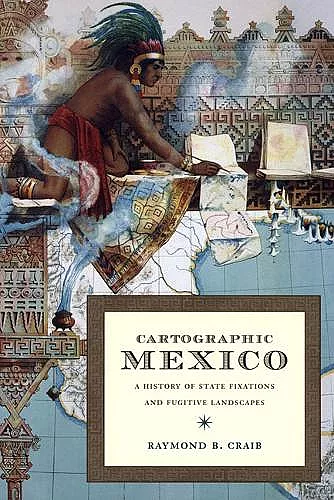Cartographic Mexico
A History of State Fixations and Fugitive Landscapes
Format:Hardback
Publisher:Duke University Press
Published:1st Nov '04
Currently unavailable, and unfortunately no date known when it will be back

Analyzes spatial history of 19th and early 20th century Mexico, particularly political uses of mapping and surveying, to demonstrate multiple ways that space can be negotiated in the service of local or national agendas.
In Cartographic Mexico, Raymond B. Craib analyzes the powerful role cartographic routines such as exploration, surveying, and mapmaking played in the creation of the modern Mexican state in the nineteenth and early twentieth centuries. Such routines were part of a federal obsession—or “state fixation”—with determining and “fixing” geographic points, lines, and names in order to facilitate economic development and political administration. As well as analyzing the maps that resulted from such routines, Craib examines in close detail the processes that eventually generated them. Taking central Veracruz as a case in point, he shows how in the field, agrarian officials, military surveyors, and metropolitan geographers traversed a “fugitive landscape” of overlapping jurisdictions and use rights, ambiguous borders, shifting place names, and villagers with their own conceptions of history and territory. Drawing on an array of sources—including maps, letters from peasants, official reports, and surveyors’ journals and correspondence—Craib follows the everyday, contested processes through which officials attempted to redefine and codify such fugitive landscapes in struggle with the villagers they encountered in the field. In the process, he vividly demonstrates how surveying and mapmaking were never mere technical procedures: they were, and remain to this day, profoundly social and political practices in which surveyors, landowners, agrarian bureaucrats, and peasants all played powerful and complex roles.
“Cartographic Mexico is a path-breaking work of deep scholarship and great theoretical sophistication in which Raymond B. Craib tells two intertwined stories. He relates the sweeping history of the Mexican state’s drive during the century following the Reforma to represent the national territory by mapping it scientifically, transforming local places into a national space, thus inventing Mexico on paper while making it both legible and susceptible to commodification. He also traces in great detail how this process worked itself out in the state of Veracruz, where officials, government surveyors, landowners, and peasant villagers continually confronted each other, sometimes violently, in a struggle to determine whether notions of place or space would ultimately prevail.”—Eric Van Young, author of The Other Rebellion: Popular Violence, Ideology, and the Mexican Struggle for Independence, 1810-1821
“Cartographic Mexico is an outstanding book. Raymond B. Craib addresses such important issues as spatial rationalization and its implementation in the modern state and the impact of modern technologies on the making of modernity. The empirical data and the uses of primary sources are excellent, and the arguments are theoretically sophisticated. Above all, it is an enjoyable read.”—Thongchai Winichakul, author of Siam Mapped: A History of the Geo-Body of a Nation
"A meticulously researched and elegantly written study that will prove of great interest to anyone interested in Latin America, mapping, or state formation." -- Ricardo Padron * American Historical Review *
"[Craib's] analysis is subtle, imaginative, and persuasive, rooted—fittingly enough for a history of cartography—in an evocative sense of local geographies. . . . This is a study that significantly contributes to our understanding of modern Mexico on multiple fronts. . . . It constitutes a lonely work of what might be called—if it existed—new bureaucratic history, detailing the narrative of several cartographic institutions, the well-connected, entrepreneurial types who staffed them and the countrymen they dealt with. In tracing the role of the geographers in codifying and representing national identity it fills a clear lacuna in studies of Mexican nationalism." -- Paul Gillingham * Journal of Latin American Studies *
"Craib makes an important and original contribution to the literature. His book should be of interest to historians, geographers and anthropologists." -- Frans J. Schryer * Hispanic American Historical Review *
ISBN: 9780822334057
Dimensions: unknown
Weight: 585g
328 pages